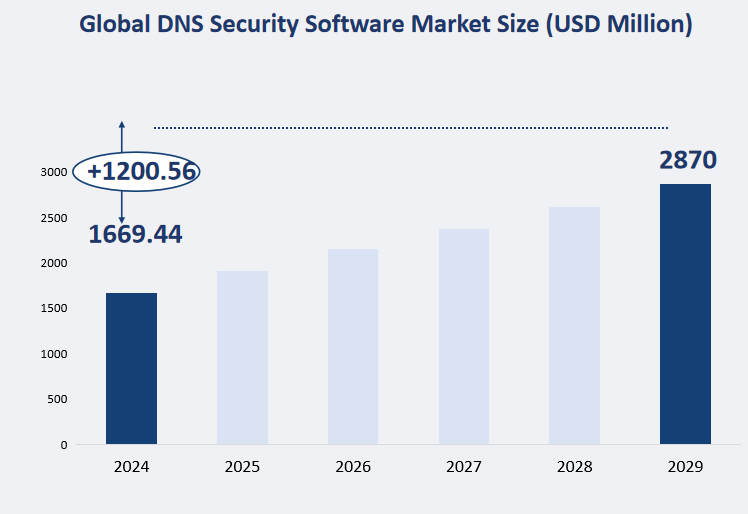Cloud-based dominates the DNS security software market, accounting for a huge revenue share of about 90.24% in 2024.

Definition
DNS (domain name system) security software is used to secure DNS servers and the websites they support. These tools redirect end-user web traffic through filters capable of identifying malware signatures and other characteristics of potentially dangerous websites and media. DNS security software provides IT personnel with tools to classify websites, categorize users, group devices, and customize usage policies. Companies use these tools to protect their employees’ endpoint devices and their own servers by blocking dangerous content, media, and websites. They can also be used to prevent employees from accessing unapproved content, such as adult or streaming sites, in the workplace. DNS-based attacks have a variety of impacts and can cause significant disruptions. To combat this, DNS security software also possesses monitoring capabilities to identify unauthorized or malicious bots that may be capable of disrupting server performance, service availability, and network connectivity.
Market by Type
Based on type, DNS security software is divided into cloud-based and on-premises. The cloud-based segment occupies the largest market share, accounting for about 90.24%, and on-premises accounts for about 9.76%. Cloud-based DNS solutions offer multiple benefits such as dedicated DNS design and management resources, global performance and scalability, high availability, robust security, easy-to-use APIs, and more. Thus, the increasing popularity of cloud-based DNS solutions is driving the growth of the DNS security software market.
Type | Value Share in 2024 |
Cloud-based | 90.24% |
On-premises | 9.76% |
Market by Application
Based on application, DNS security software is segmented into large enterprises, SMEs, and others. The large enterprises segment holds the largest market share, accounting for about 57.23%, SMEs have a market share of about 38.52%, and others account for about 4.25%.
Application | Value Share in 2024 |
Large Enterprises | 57.23% |
SMEs | 38.52% |
Others | 4.25% |
Regional Analysis and Insights
The United States dominates the global DNS security software market with a revenue share of approximately 47.43%, followed by Europe and Asia Pacific, with China dominating the Asia Pacific region. The increase in the number of distributed denial of service (DDoS) attacks in the U.S. is a major factor in the growth of the DNS security software market as DNS security software helps in preventing the damage caused by DDoS attacks.
Market Drivers
‘Cyber-attacks against DNS on the rise’
DNS security refers to the protection measures involving the DNS protocol. The Domain Name System (DNS) is an internet protocol that provides human-readable names for various web-based services, including e-mail. Acting as the internet’s phonebook, DNS converts human-readable names to IP addresses, then changes IP addresses back to names. However, the DNS (Domain Name System) has not been created using a security-by-design approach. Like many Internet protocols, the DNS system was not designed with security in mind and contains several design limitations. These limitations, combined with advances in technology, make DNS servers vulnerable to a broad spectrum of attacks, including spoofing, amplification, DoS (Denial of Service), or the interception of private personal information. Since DNS is an integral part of most Internet requests, it can be a prime target for attacks and there are many cyberattacks that can affect it – cyberattacks that can impact companies’ money, workflow, and reputation. At this point, DNS Security Software is critical. Meanwhile, DNS Security Software can protect against malware and phishing attacks by blocking dangerous websites, neutralizing botnet threats, preventing typo-squatting, improving connection speeds, and implementing additional measures to enhance overall cybersecurity.
‘Growth in digital transformation trends across countries’
As digital transformation accelerates globally, IT systems will become more and more important and tightly integrated with the business of multiple industries, so the immediate need for security capabilities including DNS security will become mainstream. Digital transformation is the process that an organization applies to integrate digital technology in all areas of a business, fundamentally changing how it delivers value to customers. Companies adopt innovative digital technologies to make cultural and operational shifts that adapt better to changing customer demands. With the increasing application of intelligence and digitalization in various industries, companies are exposed to cyberattacks, which have also increased the demand for network security, and DNS Security Software can be a good way to maintain the security of network systems. Thus, digital transformation can contribute to the increase in demand for DNS Security Software.
The DNS Security Software Industry belongs to the high-tech industry, which has high technical requirements for the company. The wide application and development of the DNS system, as well as the hackers’ constant attacks on the DNS system, have also created high technical requirements for DNS security software. Otherwise, it cannot resist all kinds of vicious attacks. Technical barriers are formed by the use of scientific and technological means, including technical barriers and innovative technical barriers, technical barriers are due to innovation in science and technology, so that technology in a certain field is in a clear leading edge, with independent intellectual property rights, access to monopoly competitiveness.
In addition, talent barriers are a major factor affecting new entrants. To achieve good safe performance, a skilled and experienced skilled and experienced cybersecurity talent. Recruiting this new breed of talent is critical to effectively driving DNS security software programs, which is for effectively driving a cybersecurity program. But attracting and retaining the right talent is no easy task. DNS security software practitioners are often under immense pressure, and organizations should realize the importance of experienced talents in building the DNS security software industry and taking effective approaches to retain valuable talent.
Top Companies
The DNS security software market is highly competitive, with major players including Cisco, Akamai, Infoblox, F5 Networks, Palo Alto Networks, Bluecat, Neustar (Vercara), OpenText (Webroot), EfficientIP, Comodo, DNSSense, DNSFilter, TitanHQ, and others. The top 3 companies account for approximately 44% of the revenue share.




